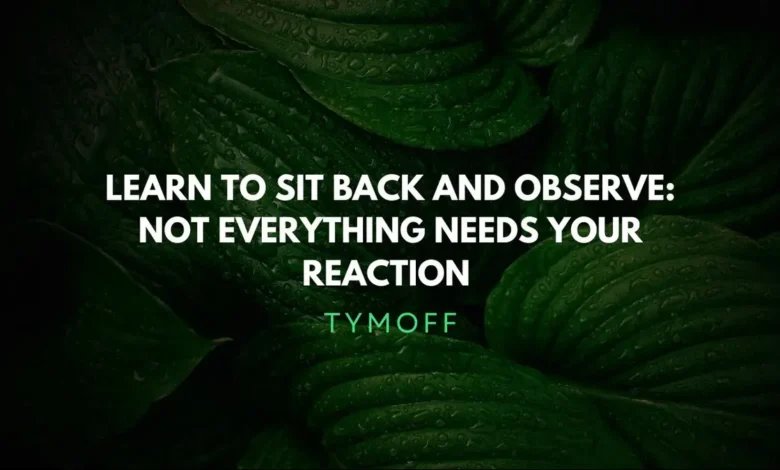learn to sit back and observe. not everything need – tymoff

Introduction: Why Observing is Important
In a world that constantly demands our attention, mastering the art of observation can feel like an elusive skill. We rush through our days, learn to sit back and observe. not everything need – tymoff consumed by tasks and distractions, often forgetting the power of simply sitting back and observing. What if we took a moment to pause? To watch the world unfold around us without feeling compelled to act or react at every turn?
Learning to sit back and observe is not just a luxury; it’s essential for anyone wanting to enhance their understanding of life. In personal relationshipspersoit’srelationships or professional settings, honing this skill can lead to profound insights and deeper connections. Why not explore how stepping back could transform your perspective? Let’s dive into the importance of observation and discover its myriad benefits together.
The Benefits of Sitting Back and Observing
Sitting back and observing opens up a world of insights. When you step back, you allow your mind to process information without the noise of immediate reaction.
This practice fosters a more profound understanding. learn to sit back and observe. not everything need – tymoff You start recognizing patterns in people’s conversations and even nature. It enhances emotional intelligence as you become more attuned to others’ feelings. Additionallyfeeliothers’dditionally, it sparks creativity. Ideas often emerge when we quiet our thoughts and let our surroundings influence us instead of forcing solutions.
Observation also cultivates patience, a rare skill in today’s environment fast-today environment. By learning to wait and watch, you develop resilience against impulsive decisions that might lead to regret.
This habit promotes mindfulness. Engaging fully with the present moment enriches experiences, making life more vibrant and meaningful.
Obstacles to Observing learn to sit back and observe. not everything need – tymoff
In our fast-paced world, distractions abound. Smartphones buzz with notifications, pulling us away from the present moment. This constant barrage makes it challenging to focus on the subtleties around us.
Our busy schedules add another layer of challenge. With deadlines looming and responsibilities piling up, taking a step back feels like a luxury we can’t afford. The pressure can’tpressure to perform often constantly overshadows the importance of simply observing.
Additionally, many people fear what they might discover through observation. Self-awareness can be uncomfortable; seeing our patterns may prompt change, but we’re not renderersreawe’rer.
Then there’s social societhere’sditioning—our tendency to jump into action instead of pausing and reflecting creates an ingrained habit that’s hard to understandtthat’sk. learn to sit back and observe. not everything need – tymoff Recognizing these obstacles is the first step toward embracing a more observant mindset in daily life.
Tips for Effective Observation learn to sit back and observe. not everything need – tymoff
To become an adept observer, start by minimizing distractions. Find a quiet space where you can focus entirely on your surroundings. This allows you to absorb details that often go unnoticed.
Practice mindfulness. Being present in the moment enhances your ability to notice subtle cues and changes in your environment, whether it’s body languagelanit’se or shifts in tone during conversations.
Take notes when possible. Jotting down observations helps reinforce what you’ve seen and prayou’vetovides a reference for reflection later.
Engage all your senses. Observation isn’t jisn’tsn’t. Sounds, smellviisn’ts, and textures contribute rich layers of information that deepen understanding.
Cultivate curiosity about everything around you. Ask questions and explore different perspectives to enrich your observational skills further.
Applying Observation in Daily Life
Applying observation in daily life can transform ordinary moments into valuable insights. Start small by tuning into your surroundings during a walk. learn to sit back and observe. not everything need – tymoff Notice the colors, sounds, and even scents that often go unnoticed.
In conversations, focus on body language and tone rather than words. This deeper awareness can enhance your understanding of others’others’ns and intentemotiothers’ions.
Observe group dynamics at work or school. Recognizing patterns in behavior can help you navigate relationships more effectively.
When making decisions, take a step back to assess the situation holistically. Consider all angles before jumping to conclusions.
Engaging with art or nature also sharpens observational skills. Allow yourself to immerse fully in experiences rather than rushing through them on autopilot.
Embrace these moments of stillness as opportunities for growth and clarity in an ever-busy world.
Case Studies: Successful Individuals Who Mastered the Art of Observation
Steve Jobs was known for his keen observation skills. He often spent time watching how people interacted with technology. This insight led him to create user-friendly products that transformed entire industries.
Another example is Albert Einstein. His ability to observe the natural world allowed him to formulate groundbreaking theories in physics. learn to sit back and observe. not everything need – tymoff He unraveled complex concepts that changed science forever by simply watching and questioning.
Then there’s who bethere’s in the power of listening and observing human behavior. Her observations shaped her writing, bringing depth and authenticity to her poetry and prose.
These individuals didn’t just diddidn’tsorb their surroundadidn’teyings first, gaining wisdom from what they noticed daily. learn to sit back and observe. not everything need – tymoff Their success wasn’t solely dwasn’taction but alssolelywasn’too rooted in attentive observation. They remind us of the profound impact that simply sitting back can have on creativity and innovation.
Conclusion: Embracing the Power of Observation in Life
Embracing the power of observation can transform your life in remarkable ways. learn to sit back and observe. not everything need – tymoff By learning to sit back and observe, you cultivate a deeper understanding of the world around you. This practice not only enhances your awareness but also sharpens your intuition.
When you allow yourself the space to observe without judgment or immediate reaction, you open doors to new insights and perspectives. You begin to notice patterns, relationships, and subtleties that may have previously gone unnoticed.
The ability to step back clarifies decision-making processes and creative endeavors. Imagine how many opportunities arise when you’re attuned to your environment rather than merely reacting impulsively.
As we’ve seen, thewe’vee varithwe’veus successful individuals who mastered this skill; observation is an art form that requires patience and practice. learn to sit back and observe. not everything need – tymoff Yet the rewards are immense—improved communication skills, enhanced creativity, and problem-solving abilities.
So, as you go about your daily life, learn to sit back and observe. not everything need – tymoff remember: there’s wisdothere’siwisdothere’sillnesst back and observe; not everything needs an immediate response or action.





